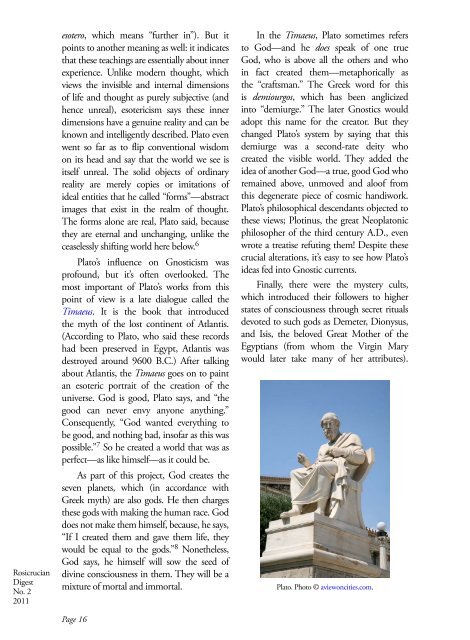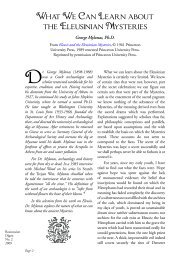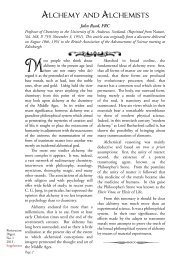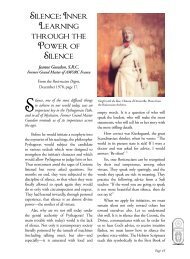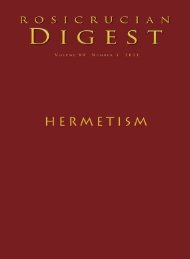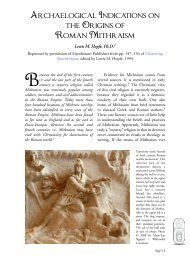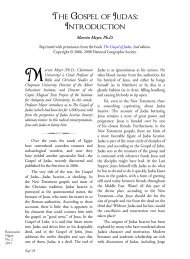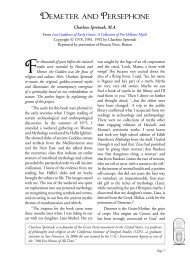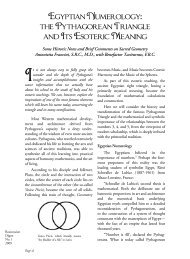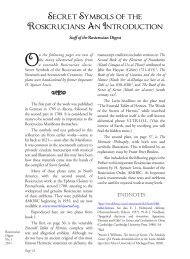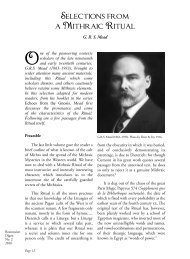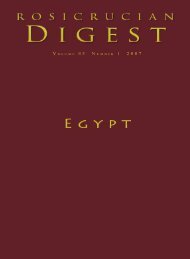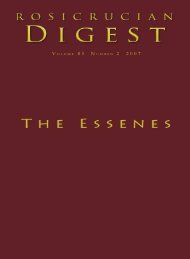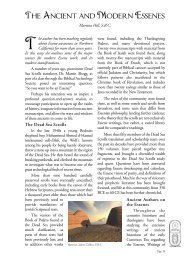Rosicrucian Digest Vol 89 No 2 2011 Gnosticism - Rosicrucian Order
Rosicrucian Digest Vol 89 No 2 2011 Gnosticism - Rosicrucian Order
Rosicrucian Digest Vol 89 No 2 2011 Gnosticism - Rosicrucian Order
Create successful ePaper yourself
Turn your PDF publications into a flip-book with our unique Google optimized e-Paper software.
<strong>Rosicrucian</strong><br />
<strong>Digest</strong><br />
<strong>No</strong>. 2<br />
<strong>2011</strong><br />
esotero, which means “further in”). But it<br />
points to another meaning as well: it indicates<br />
that these teachings are essentially about inner<br />
experience. Unlike modern thought, which<br />
views the invisible and internal dimensions<br />
of life and thought as purely subjective (and<br />
hence unreal), esotericism says these inner<br />
dimensions have a genuine reality and can be<br />
known and intelligently described. Plato even<br />
went so far as to flip conventional wisdom<br />
on its head and say that the world we see is<br />
itself unreal. The solid objects of ordinary<br />
reality are merely copies or imitations of<br />
ideal entities that he called “forms”—abstract<br />
images that exist in the realm of thought.<br />
The forms alone are real, Plato said, because<br />
they are eternal and unchanging, unlike the<br />
ceaselessly shifting world here below. 6<br />
Plato’s influence on <strong>Gnosticism</strong> was<br />
profound, but it’s often overlooked. The<br />
most important of Plato’s works from this<br />
point of view is a late dialogue called the<br />
Timaeus. It is the book that introduced<br />
the myth of the lost continent of Atlantis.<br />
(According to Plato, who said these records<br />
had been preserved in Egypt, Atlantis was<br />
destroyed around 9600 B.C.) After talking<br />
about Atlantis, the Timaeus goes on to paint<br />
an esoteric portrait of the creation of the<br />
universe. God is good, Plato says, and “the<br />
good can never envy anyone anything.”<br />
Consequently, “God wanted everything to<br />
be good, and nothing bad, insofar as this was<br />
possible.” 7 So he created a world that was as<br />
perfect—as like himself—as it could be.<br />
As part of this project, God creates the<br />
seven planets, which (in accordance with<br />
Greek myth) are also gods. He then charges<br />
these gods with making the human race. God<br />
does not make them himself, because, he says,<br />
“If I created them and gave them life, they<br />
would be equal to the gods.” 8 <strong>No</strong>netheless,<br />
God says, he himself will sow the seed of<br />
divine consciousness in them. They will be a<br />
mixture of mortal and immortal.<br />
Page 16<br />
In the Timaeus, Plato sometimes refers<br />
to God—and he does speak of one true<br />
God, who is above all the others and who<br />
in fact created them—metaphorically as<br />
the “craftsman.” The Greek word for this<br />
is demiourgos, which has been anglicized<br />
into “demiurge.” The later Gnostics would<br />
adopt this name for the creator. But they<br />
changed Plato’s system by saying that this<br />
demiurge was a second-rate deity who<br />
created the visible world. They added the<br />
idea of another God—a true, good God who<br />
remained above, unmoved and aloof from<br />
this degenerate piece of cosmic handiwork.<br />
Plato’s philosophical descendants objected to<br />
these views; Plotinus, the great Neoplatonic<br />
philosopher of the third century A.D., even<br />
wrote a treatise refuting them! Despite these<br />
crucial alterations, it’s easy to see how Plato’s<br />
ideas fed into Gnostic currents.<br />
Finally, there were the mystery cults,<br />
which introduced their followers to higher<br />
states of consciousness through secret rituals<br />
devoted to such gods as Demeter, Dionysus,<br />
and Isis, the beloved Great Mother of the<br />
Egyptians (from whom the Virgin Mary<br />
would later take many of her attributes).<br />
Plato. Photo © aviewoncities.com.


